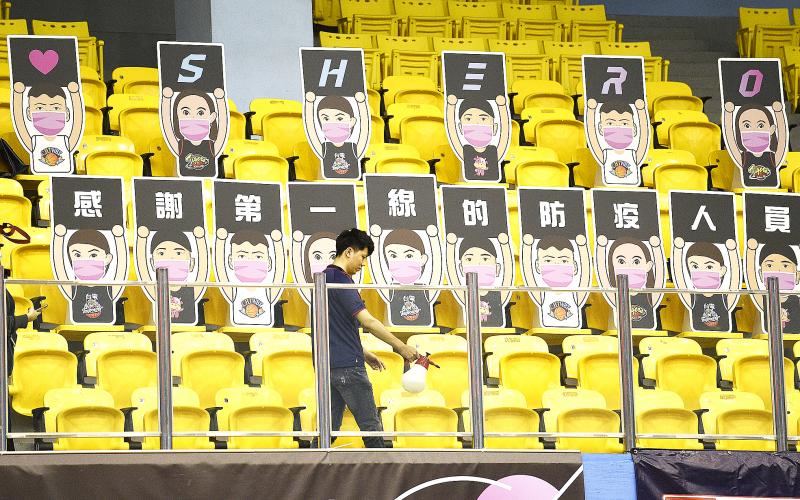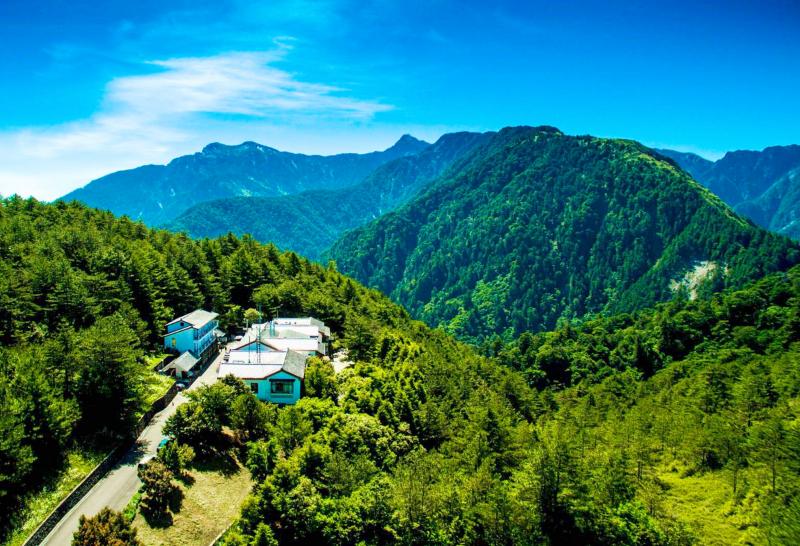Taiwanese in China’s Hubei Province are to be allowed to return to the nation on their own starting tomorrow, when the CPBL would be able to admit up to 1,000 spectators to baseball games, the Central Epidemic Command Center (CECC) said yesterday.
Minister of Health and Welfare Chen Shih-chung (陳時中), who heads of the center, said that Taiwanese in China’s Hubei Province, the epicenter of the COVID-19 pandemic, would not be required to take chartered flights or quasi-chartered flights from designated airports to return home.
The Chinese government imposed an unprecedented lockdown of Wuhan and other cities in Hubei on Jan. 23, leaving more than 1,000 Taiwanese, as well as their Chinese spouses and children, stranded in the province.

Photo: Chen Chih-chu, Taipei Times
The CECC in late February announced that the National Immigration Agency had marked the identification papers of the Taiwanese in Hubei, and that they would only be allowed to return on chartered flights.
Chen said the special markings would not be removed to allow immigration officers at airports to identify Taiwanese returning from Hubei, and that they would be required to stay at a centralized quarantine facility for 14 days before returning home.
Meanwhile, from tomorrow, up to 1,000 spectators would be able attend each CPBL game, he said.

Photo: Seanwen Yang, courtesy of the Yushan National Park Administrative Office
Deputy Minister of the Interior Chen Tsung-yen (陳宗彥), deputy head of the center, said that online reservations for lodges in national parks with mountains — including Yushan (玉山), Taroko (太魯閣) and Shei-Pa (雪霸) national parks — would be reopened today.
Chen announced that one new imported COVID-19 case (No. 439) was confirmed yesterday.
The case is a woman in her 30s, who had worked in the UK since January and returned to Taiwan on Apr. 26.
The woman reported that she had a stuffy nose and felt fatigued when she returned to Taiwan, so she received a COVID-19 test at the airport and was taken to a centralized quarantine facility, but was moved to a quarantine hotel the next day as the test came back negative, he said.
She continued to have a runny and stuffy nose, and developed an abnormal sense of taste during her stay at the hotel, so she was tested again on Monday and the result came back positive, Chen said.
CECC advisory specialist panel convener Chang Shan-chwen (張上淳) said that the woman thought she might have been experiencing menstrual fatigue on her trip back to Taiwan, so the center could not pinpoint when her COVID-19 symptoms began.
Applications for the Executive Yuan’s extended COVID-19 relief program — a one-time payment of NT$10,000 to workers not covered by social insurance programs — opened yesterday.
The center is grateful to officials at local district offices for handling the extra work, Chen said.
Those eligible are urged to not all apply on the first few days, as it would cause the offices to be overcrowded, he added.
The applications would be reviewed generously, promptly and in a way that is convenient to applicants, he said, adding that if people cannot provide documents to prove their eligibility, their application would most likely be accepted if they sign an affidavit.
About 99 percent of people who are not covered by any social insurance program and have very little savings should be trusted as long as they sign the affidavit, Chen said, adding that they would need to write a brief description of how their jobs have been affected by the pandemic.

SEPARATE: The MAC rebutted Beijing’s claim that Taiwan is China’s province, asserting that UN Resolution 2758 neither mentions Taiwan nor grants the PRC authority over it The “status quo” of democratic Taiwan and autocratic China not belonging to each other has long been recognized by the international community, the Mainland Affairs Council (MAC) said yesterday in its rebuttal of Beijing’s claim that Taiwan can only be represented in the UN as “Taiwan, Province of China.” Chinese Minister of Foreign Affairs Wang Yi (王毅) yesterday at a news conference of the third session at the 14th National People’s Congress said that Taiwan can only be referred to as “Taiwan, Province of China” at the UN. Taiwan is an inseparable part of Chinese territory, which is not only history but

CROSSED A LINE: While entertainers working in China have made pro-China statements before, this time it seriously affected the nation’s security and interests, a source said The Mainland Affairs Council (MAC) late on Saturday night condemned the comments of Taiwanese entertainers who reposted Chinese statements denigrating Taiwan’s sovereignty. The nation’s cross-strait affairs authority issued the statement after several Taiwanese entertainers, including Patty Hou (侯佩岑), Ouyang Nana (歐陽娜娜) and Michelle Chen (陳妍希), on Friday and Saturday shared on their respective Sina Weibo (微博) accounts a post by state broadcaster China Central Television. The post showed an image of a map of Taiwan along with the five stars of the Chinese flag, and the message: “Taiwan is never a country. It never was and never will be.” The post followed remarks

NATIONAL SECURITY: The Chinese influencer shared multiple videos on social media in which she claimed Taiwan is a part of China and supported its annexation Freedom of speech does not allow comments by Chinese residents in Taiwan that compromise national security or social stability, the nation’s top officials said yesterday, after the National Immigration Agency (NIA) revoked the residency permit of a Chinese influencer who published videos advocating China annexing Taiwan by force. Taiwan welcomes all foreigners to settle here and make families so long as they “love the land and people of Taiwan,” Premier Cho Jung-tai (卓榮泰) told lawmakers during a plenary session at the Legislative Yuan in Taipei. The public power of the government must be asserted when necessary and the Ministry of

Proposed amendments would forbid the use of all personal electronic devices during school hours in high schools and below, starting from the next school year in August, the Ministry of Education said on Monday. The Regulations on the Use of Mobile Devices at Educational Facilities up to High Schools (高級中等以下學校校園行動載具使用原則) state that mobile devices — defined as mobile phones, laptops, tablets, smartwatches or other wearables — should be turned off at school. The changes would stipulate that use of such devices during class is forbidden, and the devices should be handed to a teacher or the school for safekeeping. The amendments also say